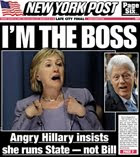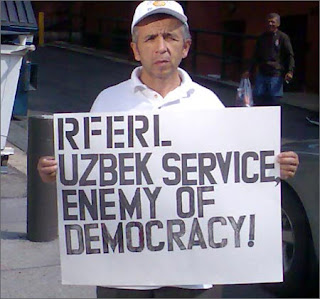More "smart diplomacy" to be found in State Department spokesperson P.J. Crowley's discussion of the above incident at the daily press briefing:
Columnist Maureen Dowd explained, in today's New York Times:
QUESTION: P.J., you told CNN that the student who asked the question yesterday was apparently lost in translation, had touched a nerve with Secretary Clinton. I was wondering if you can explain a little more of what you meant by that. And also, does Secretary Clinton have any regret? Is she sorry that she lost her cool over this offense?
MR. CROWLEY: Well, I would say two things: First, it is our understanding that the student – perhaps he was nervous in talking to the Secretary of State. He meant to say – meant to ask a question about the views of President Obama. By mistake, he said the views of President Clinton. So there was a – and he was speaking one language, but obviously, as I said, what the Secretary heard, I think you have to put it in context. Obviously, she is the Secretary of State. As we’ve seen, her husband, as a significant global figure in his own right, has his own agenda.
But as I said to CNN, it’s important to understand the context here, that one of – an abiding theme that she has in her trip to Africa is empowering women. As the question was posed to her, it was posed in a way that said I want to get the views of two men, but not you, the Secretary of State. And I think it – obviously, she reacted to that. But I think it’s part of something that she is obviously very passionate about, which is making sure that if – that the role of women in the agricultural sector and the political sector and civil society – if Africa is going to advance in the future, the role of women has to be more significant in the continent than it is today.
QUESTION: But back to my core question, though, sir.
MR. CROWLEY: And just to finish the --
QUESTION: Does she have any regret?
MR. CROWLEY: Just to finish the point --
QUESTION: Go ahead. I thought you were done. I’m sorry.
MR. CROWLEY: -- at the conclusion of the town hall, she and the young man got together and I don’t think there were any hard feelings that were --
QUESTION: But chauvinism aside, sir, does she have any regret about --
MR. CROWLEY: I have not talked to the Secretary. She is --
QUESTION: -- losing her cool as the top diplomat in public?
MR. CROWLEY: She’s currently in the air coming back from Goma and I have not talked with her.
QUESTION: Was the student selected to make – to ask a question?
MR. CROWLEY: I --
QUESTION: Pre-selected?
MR. CROWLEY: I do not know.
QUESTION: Isn’t it – doesn’t it strike you as a little bit odd to take on a student like this? It’s hardly an argument between equals, whatever he might say that’s outrageous or unsettling. Does it suggest a certain super-sensitivity on the Secretary’s part?
MR. CROWLEY: Again, obviously, she reacted to what she heard, but resolved it with the student before the event ended.
QUESTION: Just a follow-up on this. You just said that this was an error on the student’s part. Yesterday --
MR. CROWLEY: No, no, I’m saying it’s been reported that the student meant to say President Obama, said President Clinton by mistake.
QUESTION: Well, okay. No, but that’s what I’m trying to clarify, because yesterday, officials at the State Department and what the traveling party were saying that this was a translation error by the translator. You’re saying now that this was --
MR. CROWLEY: Well, I --
QUESTION: -- a student being nervous and saying the wrong thing. Which one is it?
MR. CROWLEY: We – I wasn’t there, okay? And I was careful when I talked to CNN to say there may have been an error in translation. Clearly, she reacted to the English translation of the student’s question. It has been reported – I’ve seen one report where the student said he meant to say something else rather than what he did say. There was – the traveling party went back to the French – the original question as it was posed in French to try to understand exactly what the student said. I don’t know what the sourcing was by the network that I saw last night that said that the student meant to say something else.
All I’m saying is that, to Barry’s question, which is how the Secretary responded to the question as it was posed to her in English, I think it’s important to put that in context, which is she’s in Africa focused significantly on the role of women in that country, and as it was posed to her, as she said, I’m the Secretary of State, do you want to ask – you want my opinion on an issue, I’m happy to provide it. But she’s not there to provide a perspective of --
QUESTION: I understand that, but --
MR. CROWLEY: -- as it was posed in English.
QUESTION: Right, I understand that. Okay, I guess where my confusion was is that you were describing the incident in the initial question – answer to your initial question. And I’m kind of curious why you chose to highlight the --
MR. CROWLEY: I have not talked to the traveling party today to find out if they have further clarified, based on their analysis last night. I don’t think that we have a problem with the translation per se, and the report that the student said I meant to say Obama, I said Clinton, so that there – actually, the question was fairly posed, but that the student posed the question the wrong way, I have no reason to doubt that version of events.
QUESTION: Okay. So that’s sounds to be the one you’re going with then.
MR. CROWLEY: Well --
QUESTION: I mean, you’ve gone back to that several times, so --
MR. CROWLEY: Put it this way: If you want to ask me about the Secretary’s comments, I’ll be happy to take – to go into that in further detail. I can’t speak for the young student.
Yes.
QUESTION: Can I switch topics?
MR. CROWLEY: Please. (Laughter.)
Hillary’s KO in the Congo on Monday made the covers of both New York tabloids. Using tough hand gestures not seen since “The Sopranos” went off HBO, Hillary snapped back at an African college student who asked about the growing influence of China on Africa and then, according to the translator, wanted to know: “What does Mr. Clinton think?”
It turned out that the student was trying to ask how President Obama felt about it. But before he was able to clarify, the secretary of state flared: “Wait, you want me to tell you what my husband thinks? My husband is not the secretary of state. I am.”
This raw, competitive response showed that the experiment in using the Clintons as a tandem team on diplomacy may not be going as smoothly as we had hoped; once more, as with health care, the conjugal psychodrama drags down the positive contribution the couple can make on policy.
At Tuesday’s State Department briefing, Assistant Secretary P.J. Crowley explained that Hillary was particularly irritated to feel overshadowed by men in Africa, where she is pushing her “abiding theme” of “empowering women.”
Nice try, P.J. But we all know Hillary could just as well have made the same comment in Paris. (And looking unhinged about your marriage on an international stage hardly empowers women.) She may have been steamed about Bill celebrating his upcoming 63rd birthday in Las Vegas with his posse. The Times’s Adam Nagourney irritated Clinton Inc. when he reported that Bill went to the pricey Craftsteak restaurant at the MGM Grand Hotel Monday night with Hollywood moguls Steve Bing and Haim Saban, and former advisers Terry McAuliffe and Paul Begala, among others.


